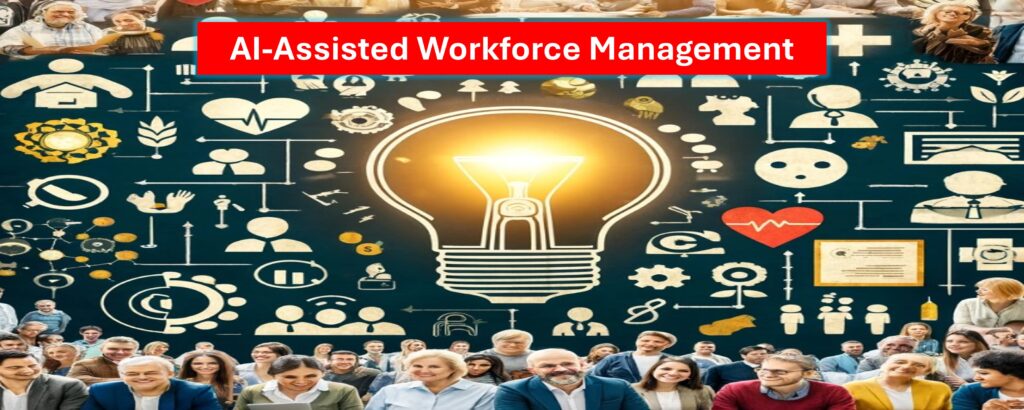
AI-Assisted Workforce Management can be a key competitive advantage. The approach to managing and incentivizing a workforce is undergoing a significant transformation. Moving beyond the traditional pay-for-performance model, companies are now recognizing the importance of offering more than just monetary rewards to attract and retain top talent.
This shift is driven by a deeper understanding of what motivates employees: meaningful work, personal growth, and a sense of belonging. Employees today seek a work environment that offers opportunities for professional development, values their contributions, and aligns with their personal goals and values. This evolution in incentive strategies is not just beneficial for employees but is also crucial for businesses aiming to thrive in a competitive landscape.
Non-monetary incentives like flexible work arrangements, professional development programs, and meaningful project assignments play a significant role in this new paradigm. They help foster a workplace where employees feel genuinely motivated and connected to the organization’s mission and values.
These aspects are not new, but have been talked up as the ‘new truth’ for years. Business have struggled to introduce and maintain these changes, being challenged not by the policies perse, but their firm’s ability to design and execute them in a manner to appeal to the complex workforces of today. Employees continue to see biases and gaps between the stated policies and on-the ground realities. As a result, businesses who effectively imagine and execute their employee management structures have been able to attract and retain the talent needed for long-term success. This is where the use of generative AI in the design and execution of workforce management policies, particularly workforce incentives, could have significant and transformative impacts on how companies motivate and engage their employees.
Some key aspects where AI could shape the future can be:
Optimizing Workforce Allocation re. Business Strategies
Generative AI can assist in optimal workforce allocation by analysing project requirements, employee skill sets, and availability. It can generate models to predict project outcomes based on different team compositions, helping strategists to assemble teams that are well-suited to achieve project goals efficiently. This optimization leads to better resource utilization, increased productivity, and higher job satisfaction as employees are matched with roles where they can excel.
Data-Driven Talent Acquisition and Retention
Generative AI can analyse extensive datasets to identify patterns and trends in employee behaviour, performance, and turnover. Strategists can use these insights to refine their hiring processes, improve employee retention strategies, and better align workforce capabilities with organizational goals. AI can help in predicting which candidates are likely to succeed in a role and which employees might be at risk of leaving, allowing for proactive measures to manage talent effectively.
Enhancing Employee Engagement and Satisfaction
AI tools can continuously monitor various parameters related to employee engagement and job satisfaction, such as work patterns, communication, and feedback. By understanding these dynamics, business strategists can implement changes to improve the work environment, enhance collaboration, and reduce burnout. This proactive approach to managing employee wellness and satisfaction can lead to a more committed and productive workforce.
Incentives Restructuring and Execution
AI-Assisted Workforce Management can be deployed in a number of incentive management areas:
Personalization of Incentives
Generative AI can analyze vast amounts of data on individual employee performance, preferences, and behaviors, allowing companies to offer personalized incentives. By understanding what motivates each employee, organizations can tailor rewards and recognition programs to individual needs, increasing their effectiveness and impact.
Predictive Analysis for Incentive Success
AI can help predict which types of financial and non-financial incentives are most likely to succeed by analysing past trends and outcomes. This predictive capability means companies can optimize their incentive programs, investing more in what works and adjusting or discontinuing what doesn’t. It allows for more strategic planning and allocation of resources in incentive programs.
Enhanced Employee Experience
Generative AI can contribute to creating a more engaging and satisfying employee experience by facilitating more interactive and gamified incentive mechanisms. For example, AI can design personalized learning and development paths, create simulation-based training, or enable virtual reality experiences for remote team-building activities.
Real-time Feedback and Adaptation
With AI, feedback mechanisms can be more dynamic and real-time, allowing companies to quickly adapt their incentive programs based on employee engagement levels and satisfaction. AI-driven platforms can continuously learn and evolve, providing insights into how incentives are performing and how they can be improved.
Ethical and Fair Incentive Management
AI can help ensure that incentives are distributed fairly and ethically by analysing data to identify biases or inconsistencies in reward systems. This can help companies maintain a fair, transparent, and inclusive approach to employee incentives, which is critical for fostering a positive organizational culture.
Future-Proofing the Workforce
Training macro-strategy
Generative AI can identify emerging trends and skills required for the future, helping companies to future-proof their workforce. Strategists can use this information to develop training programs that equip employees with the skills needed to navigate future challenges and technological advancements. This forward-thinking strategy ensures that the organization remains competitive and adaptable in a rapidly evolving business landscape.
Training Micro-strategy
By leveraging AI, companies can create personalized employee development plans that cater to the individual strengths, weaknesses, and career aspirations of each employee. AI can analyse past performance reviews, learning styles, and career progression data to design customized training and development programs. This approach not only enhances employee skills but also boosts motivation and engagement by demonstrating the company’s investment in each individual’s growth.
Automation and Efficiency
AI can automate routine tasks related to the administration of workforce management, such as employee communications, documentation, tracking performance metrics, and managing reward distributions. This automation can lead to cost savings and allow human resources teams to focus on more strategic aspects of employee engagement and development.
Ethical and Transparent Workforce Management
AI can also play a crucial role in ensuring ethical and transparent workforce management practices. By analysing data for biases and ensuring that decisions related to hiring, promotions, and rewards are based on objective criteria, AI can help organizations maintain fairness and transparency in their workforce management practices.
In conclusion
Business strategists can leverage AI-Assisted Workforce Management to gain deeper insights into their workforce, personalize employee experiences, optimize resource allocation, and future-proof their organizations. By integrating AI into workforce management, businesses can not only improve operational efficiency but also enhance employee engagement and satisfaction, paving the way for sustained business success.
#BusinessStrategy #WorkforceIncentives #EmployeeMotivation #TalentRetention #GenerativeAI #Non-MonetaryRewards #EmployeeEngagement #WorkforceManagement
About the Author
Atul Vaid has extensive experience in strategic planning, market entry consulting and new initiatives development. He has 20+ years of consulting and corporate experience with global firms, where he has handled a variety of assignments in India, the Middle East, the USA and Japan; as well as cross-border engagements run remotely out of India. He has set up the marketing services hub for a US-based management consulting and technology firm, started an online skills assessment portal, and run a global innovation program for a strategy consulting firm. Atul is based in Gurgaon, outside of New Delhi in India and can be reached via email here.
